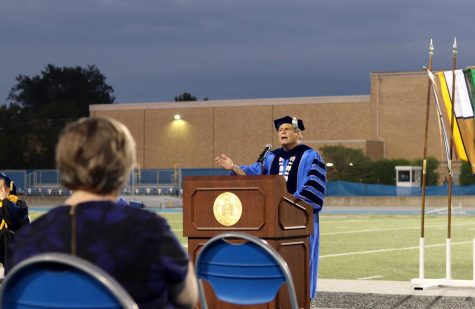Happy Birthday Mozart
Has there ever been a monolithic figure so revered, so popularized and yet so unknown?
People know the name Mozart. They can recognize his melodies. But can they name any of them?
That Mozart’s music can have such a ubiquitous popularity speaks volumes to the range of his work. His music is catchy enough to capture broad appeal, but contains the nuanced sophistication to collect the admiration of musicians.
“Myself as a listener, I can listen and think, ‘Wow, what a gifted composer he was’ and to the point where he’s almost predictable,” says Chris Dickey, a junior music education major who performs Mozart concertos on his euphonium.
“But then he’ll do something that disrupts that, and I think that’s really clever,” he says. “You have certain expectations, and he changes it just slightly.”
As Wolfgang Amadeus Mozart turned 250 on Jan. 27, the world celebrated and reflected on his work. Surely, Mozart has long played an impact on pop culture but his strongest influence still remains with those who study, enjoy and perform music.
Here’s a sampling, from students and professors at Eastern Illinois University, of how Mozart has impacted their careers and their fields of study.
The Music Historian: Peter Loewen, an associate professor of musicology, teaches the three-semester History of Western Music class at Eastern. In the class, he begins by dispelling a number of myths about Mozart. Take for instance his death (he wasn’t poisoned by a rival), his burial (he did not rest in a pauper’s grave) and his personality (he’s an eccentric, but also a serious and well-read intellect).
Mozart also played an important role in subtly presenting important social issues of the time, especially in his operas. Perhaps his two most famous operas, The Marriage of Figaro and Don Giovanni, focused on an elite class that was corrupt and spoiled. They were composed in 1786 and 1787; the French Revolution occurred two years later in 1789. That is a point Loewen stresses.
But in studying Mozart, the music not the man, Loewen imparts the genius of the composition. Looking at his manuscripts, one might observe the measures do not line up perfectly on the sheet music. That is a sign that Mozart did not compose his melodies in a methodical and mechanical process, like most of everyone else. The reason: he was probably transcribing from his mind.
“He’s got one of those photographic memories, and he was just copying out the notes,” Loewen said.
Nowadays, Mozart operas and symphonies are must-haves for concert halls hoping to make a profit. The 1984 film, “Amadeus,” only propelled his popularity further.








































